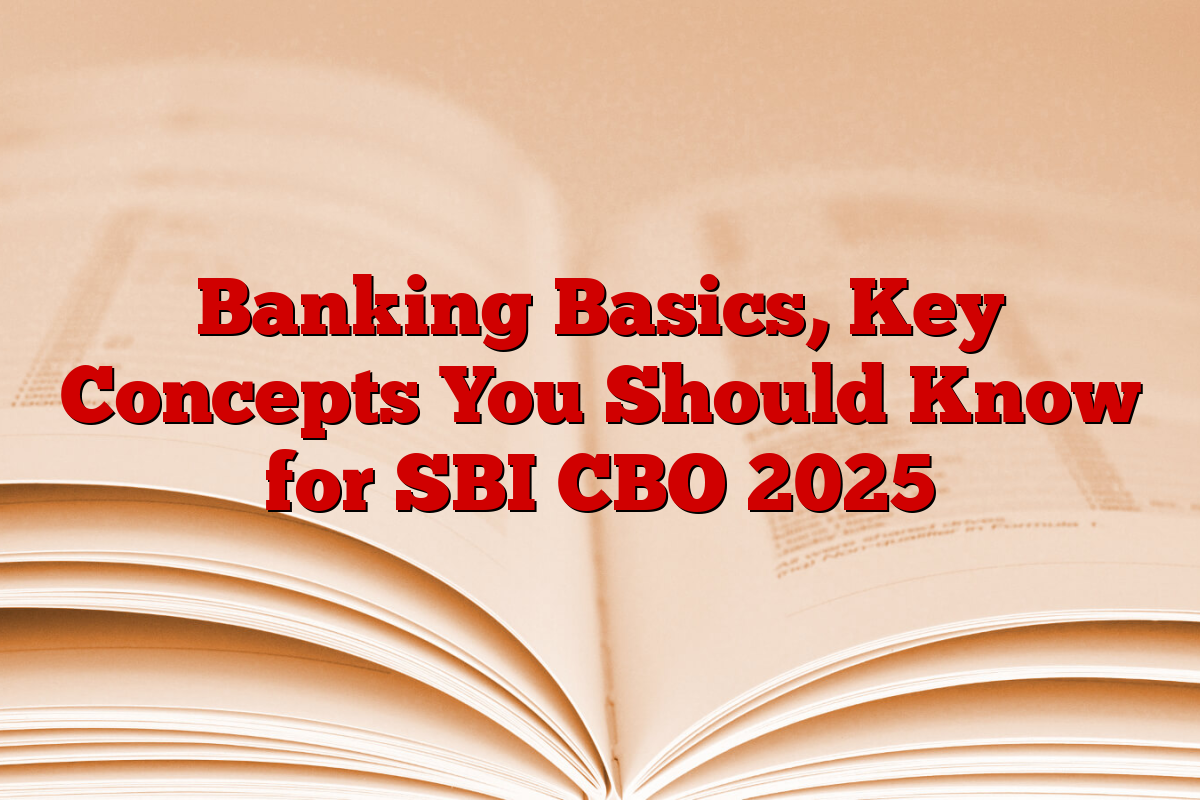It is important to understand the basic concepts of banking to crack the SBI CBO (Circle -based Officer) 2025 examination. This examination tests your knowledge about core banking operations, financial awareness and regulatory environment. To clean the SBI CBO 2025 exam, a clear understanding of banking basics is a must. Ensure that you modify important concepts such as banks, banking words, RBI function and recent trends. Let us go through major banking concepts that you should be familiar with.
Major concepts you should know for SBI CBO 2025
Banking has referred to the activities of depositing individuals and businesses and lending money. Banks act as financial middlemen who help borrowers from Saver in channel funds. In addition to borrowing and borrowing, banks also provide various services such as money transfer, digital banking, foreign currency and investment facilities.
Types of banks in India
There are many types of banks that work under the supervision of the Reserve Bank of India (RBI):
1. Commercial bank
These include public sector banks SBI And private sector banks like HDFC. They provide banking services to the public and businesses.
2. Co -operative bank
These banks are owned and operated by their members. They serve rural and semi-urban areas.
3. Regional Rural Bank (RRB)
RRBs are sponsored by public sector banks and focus on agriculture and rural development.
4. Small finance bank
They provide basic banking services to small businesses, micro industries and low -income homes.
5. Payment bank
They provide services such as deposit and money transfer, but cannot give loans or issue credit cards.
Banks of banks
Banks do many important tasks that support the economy:
- Accepting deposits: savings accounts, current accounts and fixed deposits.
- Providing loans and advances: Home Loan, Personal Loans and Professional Loans.
- Relations Services: NEFT, RTGS, IMPS, and UPI.
- Digital Banking: Internet Banking, Mobile Banking and Digital Wallet.
- Forex services: for passengers and businesses involved in international trade.
Important banking terms
1. Repo rate
This is the rate on which RBI pays money to commercial banks. When the repo rate increases, the loan becomes expensive.
2. Reverse repo rate
This is the rate at which banks park their surplus funds with RBI. This helps manage liquidity in the system.
3. CRR (cash reserve ratio)
The percentage of total deposits that banks are required to keep in cash with RBI.
4. SLR (statutory liquidity ratio)
The percentage of deposits that banks should maintain liquid assets like gold or government securities.
5. NPA (non-performing asset)
A loan that has not been repaid for more than 90 days is considered as NPA.
6. Base rate and MCLR
These are minimum interest rates under which a bank cannot lend. MCLR has changed the base rate system in most banks.
Banking regulatory body
1. Reserve Bank of India (RBI)
RBI is the central bank of India. It controls the banking system, manages monetary policy, and ensures financial stability.
2. NABARD
National Bank for Agriculture and Rural Development promotes rural development and provides credit assistance to farmers.
3. Sebi
Although not directly related to banking, SEBI controls the capital market, in which banks participate.
4. Idardi
India’s Insurance Regulatory and Development Authority oversees the insurance sector.
Priority Borrowing (PSL)
RBI requires banks to lend a certain percentage of their loans in specific areas such as agriculture, micro and small enterprises, education and housing. It helps in inclusive development.
Know your customer (KYC)
KYC bank is a process to verify the identity of customers. This includes presenting documents such as Aadhaar, PAN and address evidence. It helps in preventing money laundering and fake activities.
Latest trends in banking
- Digital banking
With an increase in internet usage, digital banking services like UPI, mobile app and e-wallet have become very common. - Fintech integration
Banks are collaborating with Fintech companies to offer fast and smart services. - Cyber security
Bank customers are investing in security technologies to protect data and financial transactions.

